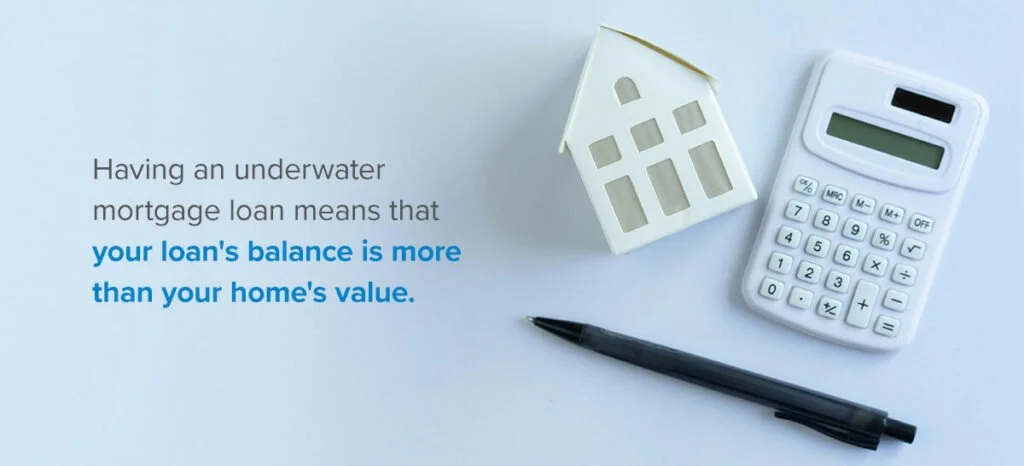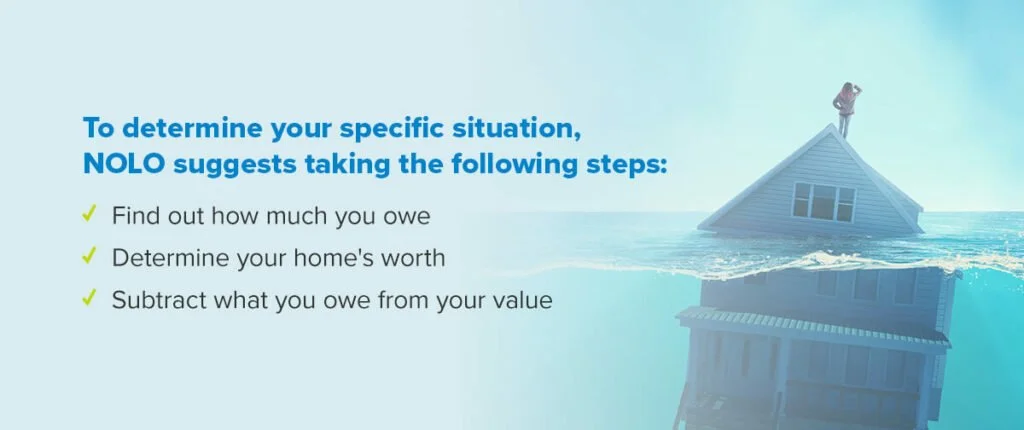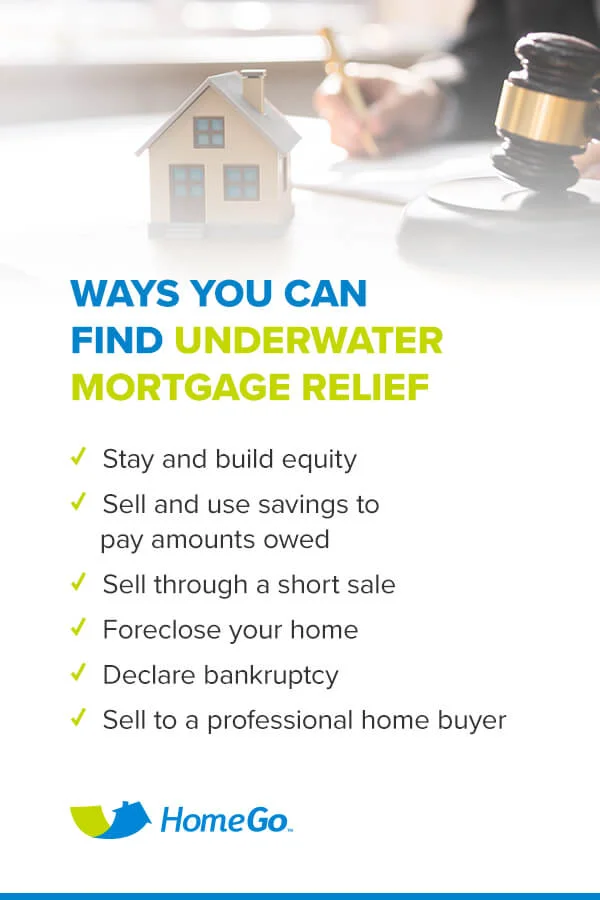Falling behind on your mortgage payments can quickly make you feel like you’re drowning, so it’s no surprise that they call it an “underwater mortgage” when someone owes more on their home than its current market value.
Fortunately, you do have options, even if your mortgage is underwater. Underwater mortgages are more common than you might think. You’re not alone. Millions of Americans have been in this position, and — most importantly — they’ve made it through.
Read on to learn what you can do if you find yourself being underwater on your mortgage.
The Basics: Underwater Mortgage 101

What exactly does it mean to be underwater on a mortgage? Having an underwater mortgage loan means that your loan’s balance is more than your home’s value.
For instance, let’s say you owe $300,000 on your loan. Your home’s market value is $250,000. Your mortgage is $50,000 more than your home’s value, so you’re underwater.
Even if you’re making payments on time, you can still find yourself with an underwater mortgage if the property value drops.
How Does an Underwater Mortgage Happen?
How could this happen? According to Investopedia, an underwater house value may result when property values fall. If housing values deflate and you don’t have any equity (or have negative equity), you may end up underwater.

To determine your specific situation, NOLO suggests taking the following steps:
- Find out how much you owe: You can easily find out how much you owe on your mortgage by looking at your recent mortgage statement. Look for the unpaid principal balance to determine how much of the loan is due. If you’re having trouble finding your remaining balance, you can talk to the company responsible for your loan. They can also provide you with a payoff statement detailing exactly how much you owe, including any fees.
- Determine your home’s worth: Finding the market value of your home is essential to determine whether you’re underwater. There are multiple ways you can find your home’s value, including hiring an appraiser, talking to a real estate agent or comparing prices to homes for sale in your neighborhood.
- Subtract what you owe from your value: Now that you have the amount you owe and your home’s value, you can determine if your mortgage is underwater by subtracting the two values. If the amount you owe is more than the worth of your home, then your mortgage is underwater. For example, you’re underwater if you owe $300,000 to your lender, but your home is worth $275,000.
How Does the House being Underwater Affect Selling?
If your house is underwater, how might that affect your ability to sell your home? This situation can make selling the traditional way more complicated.
Buyers (understandably) are only willing to pay market value for a home, which leaves you unable to pay off the mortgage.
Having a house underwater may also keep you from refinancing. In many cases, you can’t get a new loan if your home’s current value isn’t high enough to act as security for the new loan.
A house underwater may also put you at a higher risk of foreclosure. If you’re in a position where you need to refinance or sell but can’t, the threat of foreclosing grows.

What to Do If You’re Underwater on Your Mortgage
If you have a house underwater, there are ways you can find underwater mortgage relief, including:
- Stay and build equity: You can choose to stay in your home and pay your mortgage slowly, but this will take considerable discipline and patience. To make these payments, you may need to get a second job to make extra income. You’ll likely need to reorganize your budget to accommodate these payments, putting any additional income you make toward your mortgage. If you’re living in your dream home, this might be an excellent option if you’re willing to do the work.
- Sell and use savings to pay amounts owed: If you don’t want to stay in your home, you can choose to sell it instead. Keep in mind that you’ll lose money when you’re selling a home using the traditional process with an underwater mortgage. The only way you can sell your home on the market is if you have the cash on hand to account for the difference between the value of your home and how much you still owe on your mortgage. You will have to pay the difference to the lender and real estate commission costs. While this is a viable option for some people, it can cause you to lose a significant amount of money.
- Sell through a short sale: A short sale is another option for individuals who don’t have the cash on hand to sell traditionally on the market. However, you’ll need to provide proof to your lender that shows you’re unable to afford your monthly payments and can’t catch up. The short sale process isn’t entirely in your control since your lender will need to make the final decision about whether a buyer’s offer is approved.
- Foreclose your home: During a foreclosure, your lender takes complete control of your home since you can’t make your monthly mortgage payment. Foreclosure is often the last resort since you’ll be evicted from your home as your lender tries to sell it as quickly as possible. A foreclosure can be a stressful process, and it can be challenging to secure another mortgage for a few years following a foreclosure, so it should be a last resort after you’ve exhausted your other options.
- Declare bankruptcy: Like foreclosure, filing for bankruptcy should be a last resort since it’s emotionally challenging. You’ll either have a plan to repay your debt or sell your assets. Filing for bankruptcy can be an expensive process, as well.
- Sell to a professional home buyer: There’s one final option for homeowners who have an underwater mortgage. You can choose to sell your home to a professional home buyer, regardless of the condition of your home, and use the cash to pay off your mortgage. A professional home buyer can help you avoid some less ideal solutions, such as a short sale or foreclosure.
Sell Your House for Cash With HomeGo
If your home is underwater, you can sell to a professional home buyer like HomeGo. HomeGo buys houses with cash, so you can quickly liquidate your asset and, ideally, pay off the mortgage. A quick, easy sale to HomeGo allows you to avoid foreclosure.
Best of all, the sale will close in as few as seven days. Because HomeGo buys homes in as-is condition, you won’t even have to worry about inspections, appraisals, repairs or financing falling through. Move out and move on quickly and conveniently.
Get started by scheduling a walkthrough today.





